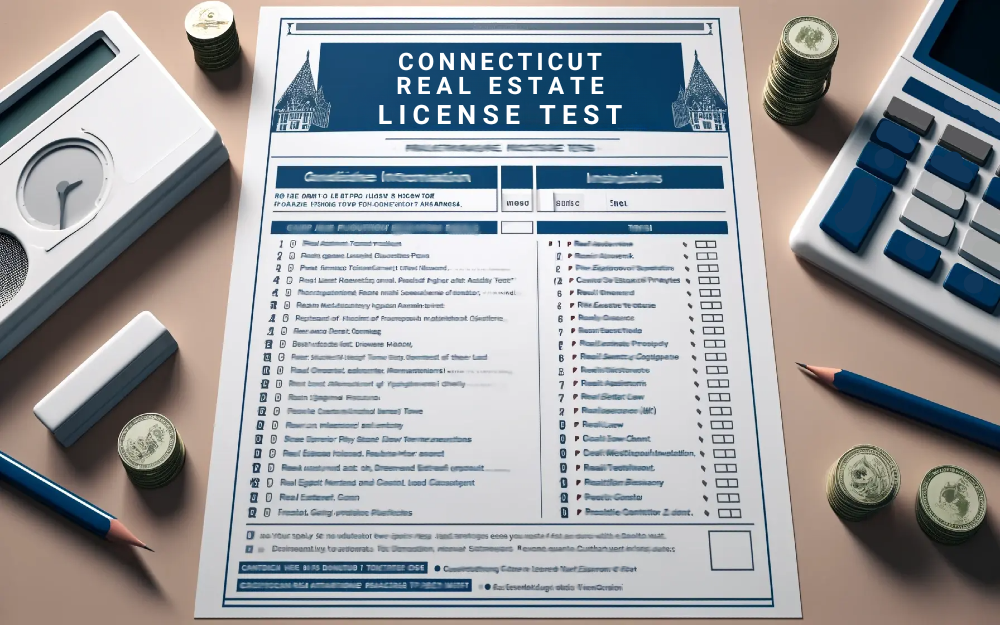
Determine your answer, then click the arrow to see the correct response.
Which of the Following Is True Regarding the Connecticut Real Estate Commission?
A) It consists of five members appointed by the Governor.
B) It has the authority to revoke real estate licenses.
C) It is responsible for setting real estate commission rates.
D) It does not regulate real estate advertising.
Correct Answer: B) It has the authority to revoke real estate licenses.
Explanation: The Connecticut Real Estate Commission has the power to revoke, suspend, or refuse to renew real estate licenses.
John, a Licensed Real Estate Salesperson in Connecticut, Receives a Referral Fee From a Home Inspector. This Is:
A) Legal if disclosed to the client.
B) Legal without disclosure.
C) Illegal regardless of disclosure.
D) Allowed if approved by his broker.
Correct Answer: C) Illegal regardless of disclosure.
Explanation: Connecticut law prohibits real estate licensees from accepting referral fees from home inspectors.
What Is the Primary Purpose of the Connecticut Real Estate Guaranty Fund?
A) To fund real estate education programs.
B) To provide compensation for consumers harmed by licensee misconduct.
C) To support the operations of the Real Estate Commission.
D) To subsidize low-income housing projects.
Correct Answer: B) To provide compensation for consumers harmed by licensee misconduct.
Explanation: The Guaranty Fund is designed to protect consumers who suffer losses due to dishonest or unethical actions by licensed real estate professionals.
Which of the Following Is NOT Required for a Valid Real Estate Contract in Connecticut?
A) Mutual consent.
B) Consideration.
C) Witness signatures.
D) Legal purpose.
Correct Answer: C) Witness signatures.
Explanation: Witness signatures are not a requirement for a valid real estate contract in Connecticut; the essential elements are mutual consent, consideration, and a legal purpose.
What Is the Maximum Fine the Connecticut Real Estate Commission Can Impose for a Single Violation?
A) $500
B) $1,000
C) $5,000
D) $10,000
Correct Answer: C) $5,000
Explanation: The Connecticut Real Estate Commission can impose a fine of up to $5,000 per violation.
A Property Manager in Connecticut Wants To Evict a Tenant for Non-Payment of Rent. Which of the Following Steps Must Be Taken First?
A) File an eviction lawsuit immediately.
B) Serve a notice to quit.
C) Change the locks on the property.
D) Notify the Real Estate Commission.
Correct Answer: B) Serve a notice to quit.
Explanation: The landlord must serve a notice to quit before filing an eviction lawsuit for non-payment of rent.
What Is Required for a Real Estate Salesperson To Transfer Their License to a New Broker in Connecticut?
A) Complete a new license application.
B) Notify the Real Estate Commission in writing.
C) Pay a transfer fee of $100.
D) Take an additional 20 hours of education.
Correct Answer: B) Notify the Real Estate Commission in writing.
Explanation: Salespersons must notify the Real Estate Commission in writing to transfer their license to a new broker.
Mark Is a Connecticut Real Estate Agent Representing a Buyer. The Buyer Asks Mark To Recommend a Home Inspector. Mark Should:
A) Recommend one inspector that he frequently works with.
B) Provide a list of several qualified inspectors.
C) Refuse to recommend any inspectors to avoid liability.
D) Recommend the inspector who offers the highest referral fee.
Correct Answer: B) Provide a list of several qualified inspectors.
Explanation: To avoid any potential conflicts of interest, Mark should provide a list of several qualified inspectors for the buyer to choose from.
Under Connecticut Law, When Must a Real Estate Licensee Provide the "Connecticut Residential Property Condition Disclosure Report" to a Buyer?
A) At the closing.
B) Prior to the buyer making a written offer.
C) Within three days of the offer being accepted.
D) It is not required.
Correct Answer: B) Prior to the buyer making a written offer.
Explanation: The disclosure report must be provided to the buyer before they make a written offer on the property.
What Is the Primary Purpose of the "Designated Agency" in Connecticut Real Estate Transactions?
A) To allow one agent to represent both parties.
B) To permit two agents from the same brokerage to represent different parties in the same transaction.
C) To eliminate the need for buyer agency agreements.
D) To increase the commission rates for brokers.
Correct Answer: B) To permit two agents from the same brokerage to represent different parties in the same transaction.
Explanation: Designated agency allows two agents from the same brokerage to represent the buyer and the seller in the same transaction, with each agent acting in the best interest of their respective client.
